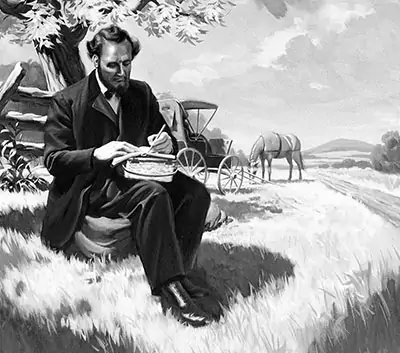
The first printing of the Advent Review and Sabbath Herald was November 1850. Its forerunner, ThePresent Truth, began in 1849. Editor James White served intermittently as editor of both from the beginning until his death in 1881. Featured this month is a letter to the editor from December 18, 1860, along with the editor’s response. This was not as we do today, but letters were often printed as articles. It was a way for the editor to share important doctrine and understanding with readers, all while answering the individual. The adjacent letter is from a non-Adventist believer to James White, then editor. Note first that it was not only Adventists that read the Review, revealing the magazine’s use as a “missionary journal.” Also note the level of proficiency and knowledge of James White, who candidly responds to the reader. When one realizes he essentially had only a year of formal education, he is remarkably well read, logical, and articulate.—Editors.
Mr. Editor: I am seeking light on an important question. It is the subject of the Sabbath. In the position which you hold through the providence of God, you are enabled to accomplish much towards elucidating this question, which, to the minds of many, is obscure. The commandment is plain, but why, I would enquire, has not that commandment been kept by such great and good men as Luther, Whitefield, Wesley, and many others, whom the Lord used as especial instruments in the dissemination of His truth as it is in Jesus? To me it appears most unlikely that such men as the above-mentioned could, without a good or sufficient reason therefore, ignore, as it were, the fourth commandment. I want to keep the commandments. I mean to so do through the grace of God. During the last twenty-two years I have been taught to remember the first day instead of the seventh, apparently in direct violation of the holy Word of God. If it be true that I have throughout my whole life so grievously sinned respecting this, may the Lord forgive me, and shed abroad in my beclouded mind light, and enable me to set my face like a flint Zionward, and to turn my feet fully into His testimonies. Much depends upon your reply, if you kindly grant any. If you do notice this, do it as early as possible, for I am very anxious concerning it. O for light! I remain your brother in Christ. Henry C. Busby
The Editor Responds
You say, “The commandment is plain,” and that you “want to keep the commandment.” That is a safe position. Hold on where you are, Bro. B., while we take a second view of these reformers. Why the reformers held opinions so unscriptural and various on the Sabbath question probably no one will be able to fully explain. “As regards the Sabbath, or Sunday,” says Luther, “there is no necessity to keep it; but if we do, it ought to be not on account of Moses’ commandment, but because nature teaches us from time to time to take a day of rest.” (Michelet’s Life, Book iv, Chap. 2, as quoted by W. B. Taylor, in his discussion with J. N. Brown.)
Wesley, on the other hand, teaches the perpetuity of the moral law in a most clear and forcible manner, as you will see by the tract we send you containing extracts from his sermons on the law. Here are two reformers, Luther and Wesley, taking opposite positions on this question. We cannot follow them both; therefore the teaching and practice of the reformers should have no weight in determining our duty in regard to keeping the commandments of God. Again, to follow the reformers is to suppose they were exactly right on all points. But in taking such a position we have staring us in the face not only the fact that they differed among themselves, therefore could not all be right, but also another fact, that if Luther was all right on all points of theology, Whitefield and Wesley could not be reformers, but could only enjoy the benefit of the reformation under Martin Luther. We regard Luther, Whitefield, and Wesley as great reformers, therefore conclude that God has not laid the great work of reform upon any one man, to be accomplished in his short lifetime. And why not have a reform as to the Sabbath as well as on other important questions? And is it not possible that this is the very time for it? See Rev. 14:12; 12:17; Isa. 8:16.
The Lutherans may stop with Luther, the Methodists with Wesley, but God’s free men will go on as the light opens before them from the holy Word of God. We send you also a pamphlet entitled, “Truth Found,” etc., in which you will see that Protestant divines are in confusion on the Sabbath question. As you read, think of what Isaiah says, chap. 2:22, “Cease ye from man, whose breath is in his nostrils: for wherein is he to be accounted of?” Also think of what the wise man has said, Eccl. 12:13, “Let us hear the conclusion of the whole matter: Fear God, and keep his commandments: for this is the whole duty of man.” J. W.
*Advent Review and Sabbath Herald, Battle Creek, Michigan, Dec.18, 1860, pp. 4, 5.